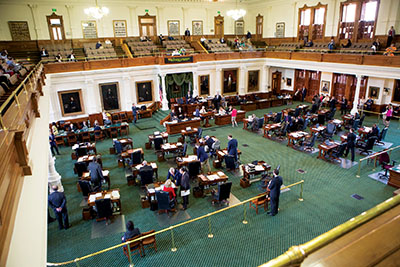By Carolyn Barta
The 84th Texas Legislature convened for its 140-day regular session in January 2015 with an infusion of tea-party backed members and the first change in top state political leadership in more than a decade. Texans could easily claim one of the most conservative and Republican-dominated governments in the country. Legislators cut taxes, beefed up border security, and passed more permissive gun laws.
But for some in the GOP, it wasn’t conservative enough. Bills that failed included measures that would reinforce the state’s ban on gay marriage, provide new school-choice options, end in-state college tuition for illegal immigrants, and prohibit “sanctuary cities” where police can’t ask those they stop about immigration status.
Legislators easily crafted a record $209.4 billion biennial state budget, a 3.6-percent increase, made easier by a robust economy that produced a forecast of $17 billion in uncommitted funds.
Candidates who promised tax cuts were able to deliver. Lawmakers cut the business franchise tax by 25 percent, or $2.56 billion over two years, and increased property tax homestead exemptions that, if approved by voters, would save the average homeowner about $125 annually. Besides covering the $3.8 billion in tax cuts, the budget stockpiled funds for an economic downturn, or other unforeseen events, with $6.4 billion in unspent revenues and $11 billion in the oil-and-gas-production fed Rainy Day Fund.
Democrats argued that the conservative approach to spending left such priorities as public schools and health care underfunded, including failure to address long-standing school finance inequities.
A Travis County district court judge ruled the state’s school finance system unconstitutional in August 2014 because of inadequate funding, distribution flaws, and because it imposed a de facto state property tax. Some 600 school districts — more than two-thirds of the districts in Texas — had filed a massive lawsuit against the state after lawmakers slashed public school funding in 2011. The state appealed the district court ruling to the Texas Supreme Court, and the higher court wasn’t expected to render judgment until late 2015 or even 2016. Most legislators wanted to hear that ruling before attempting a school finance overhaul, even if it meant a special session might have to be called by the governor before the next regular session in 2017.
As for spending, legislators found a way to boost the state’s long insufficient budget for roads and highways, without raising tolls, fees, debt, or taxes. The transportation package would require voter approval of a revenue shift from the general sales tax and motor vehicle sales tax. The Texas Department of Transportation had said it needed another $5 billion a year to keep congestion from getting worse and to maintain roads, and leaders estimated the package, beginning in 2018, would ultimately give TxDOT an additional $4 billion a year.
Republicans were overwhelmingly in control. They held all statewide offices, had their largest majority (20–11) in the Texas Senate, and held roughly two-thirds of the 150 House seats.
New leadership came in the top three political offices — governor, lieutenant governor, and attorney general. After 14 years as governor, Rick Perry, longest-serving governor in Texas history, relinquished the office to make a second run for president, joining fellow Texan, U.S. Sen. Ted Cruz, in a crowded GOP presidential primary field.
Greg Abbott, former attorney general, became governor after easily defeating the Democratic nominee, State Sen. Wendy Davis. Abbott’s style was more low-key than Perry’s, working mostly behind the scenes to deliver a largely harmonious session, one marked by its lack of theatrics and acrimony.
It was a far cry from two years before, when the Legislature was forced into special sessions to finish business. The first special session in 2013 will long be remembered for Wendy Davis’ abortion-bill filibuster that hamstrung Senate action in the final hours. It was the climax of a session torn asunder by stringent anti-abortion bills, and it launched Davis’ unsuccessful run for governor. It also spelled future defeat for Lt. Gov. David Dewhurst, who lost control in hours of pre-adjournment mayhem.
Dewhurst, Senate presiding officer for 12 years, was defeated in a Republican primary runoff by Dan Patrick, a state senator from Houston and one-time talk show host considered the most conservative candidate in the four-man primary. In the attorney general’s slot, Abbott was succeeded by Ken Paxton, a former legislator from Collin County who had strong tea-party support. Other new statewide office faces included Land Commissioner George P. Bush, nephew of former governor and President George W. Bush.
Abbott claimed among his successes the authorization of:
• An additional $800 million for border security to be used for public safety personnel, technology, and local resources.
• More than $400 million to elevate university research programs and $40 million for the Governor’s University Research Initiative to attract top-notch researchers.
• $130 million to enable school districts in the state’s half-day pre-kindergarten programs to receive extra funds if they adopt new standards.
Contentious gun bills that passed were a “campus carry” law that will allow licensed Texans who are 21 years and older to carry concealed handguns in most state university buildings and an “open carry” law that will allow licensed Texans to openly carry handguns in hip or shoulder holsters.
After Texas passed the country’s most sweeping anti-abortion measures in 2013, the 2015 Legislature approved only one major abortion bill, one that made it more difficult for minors to obtain court approval for an abortion without parental permission.
Some Republicans wanted to repeal a law in effect since 2001 that allows in-state college tuition for unauthorized immigrants who graduate from public high schools. Others saw it as detrimental to the job pool for Texas employers, and the law was preserved. Another conservative-backed measure that failed was a $100 million school voucher plan that would allow lower-income public school children to transfer to private or religious schools.
In other action, the Legislature: moved the investigation of state officials out of Travis County and into their home counties; banned cities, such as Denton, from restricting within city limits the oil and gas drilling practice known as fracking; decriminalized most aspects of truancy; and legalized access to low-THC marijuana extracts to treat people with symptoms of intractable seizures. Other marijuana bills were snubbed, and a bill outlawing texting while driving failed to pass the Senate.
The session was notable for its orderly work, and a House that often moderated positions of the Senate. Speaker Joe Straus, R-San Antonio, who presided over his fourth regular House session, commended members for working at a slow and steady pace. He termed it a “cautious, conservative session.”
Carolyn Barta, a retired Dallas Morning News political writer, is a journalism professor at Southern Methodist University.
This article originally appeared in the Texas Almanac 2016–2017.


